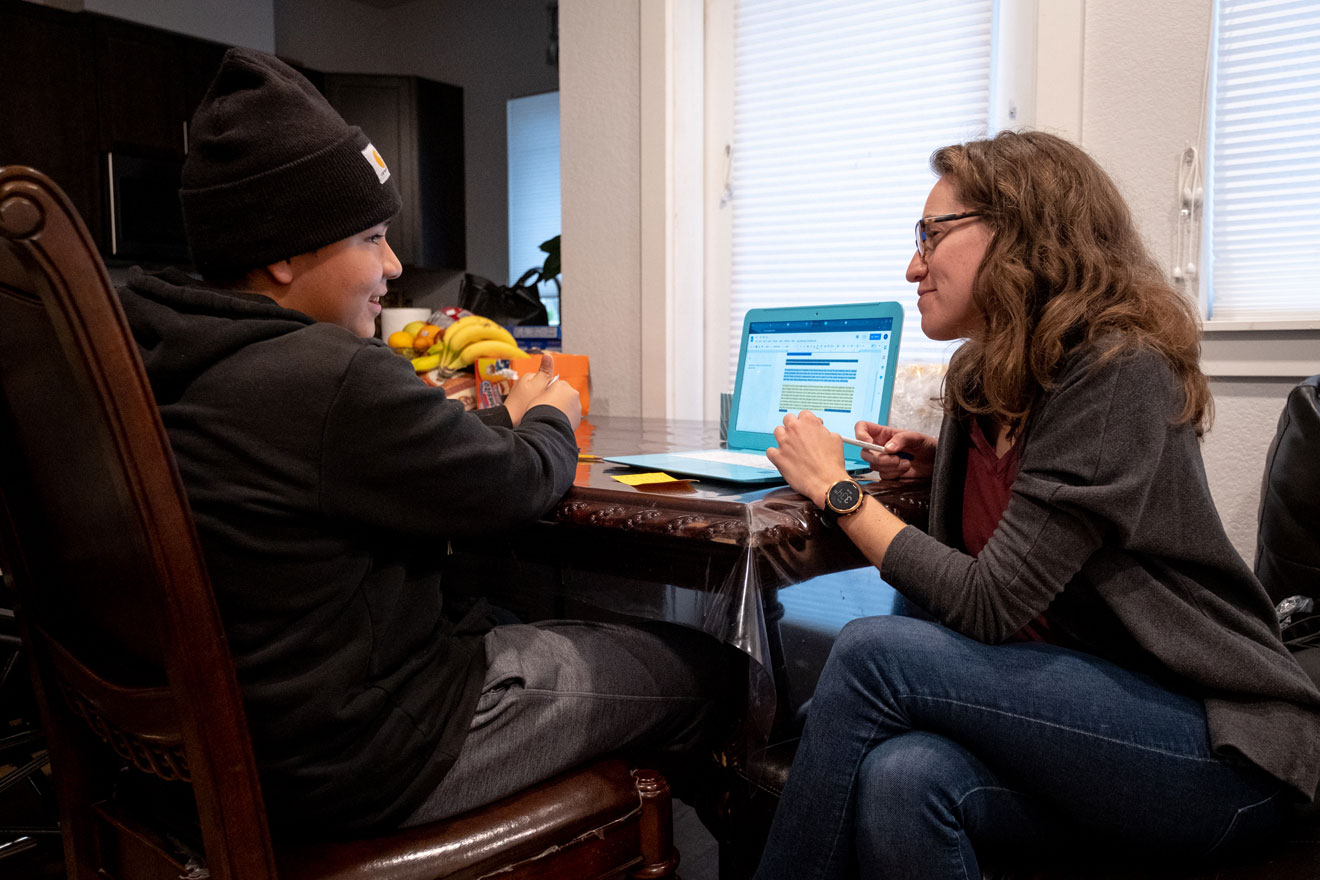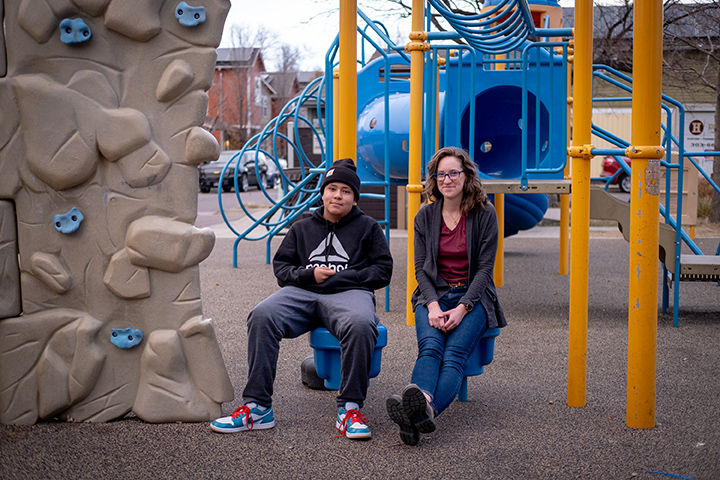
HollyAnne Giffin, a tutor through the Boulder-based program Engaged Latino Parents Advancing Student Outcomes, assists 12-year-old Gabriel Fernandez with his school work at Fernandez’s home in Boulder in November 2021.
Photos by Eli Imadali
HollyAnne Giffin, a tutor through the Boulder-based program Engaged Latino Parents Advancing Student Outcomes, assists 12-year-old Gabriel Fernandez with his school work at Fernandez’s home in Boulder in November 2021.
Photos by Eli Imadali
When HollyAnne Giffin began tutoring 12-year-old Gabriel Fernandez last winter, they worked on math homework via Zoom. As they got to know one another, they took adventures beyond their screens.
Last spring, they experimented with elephant toothpaste at a neighborhood park, building on Fernandez’s middle-school science curriculum. They took a bike ride and a hike. When school was out this past summer, Giffin called Fernandez on the phone and asked him to read passages from a book about Louis Armstrong to increase his confidence and fluency.
“It gives me a bigger idea of how to understand things,” says Fernandez of tutoring, in an email, adding that their outings together are a mix of information, fun and sometimes an opportunity to talk about Boulder’s history.
Giffin and Fernandez are part of a tutoring program at Engaged Latino Parents Advancing Student Outcomes (ELPASO), a community organization that helps Latinx parents prepare their children for and succeed in Boulder County and St. Vrain schools. Teresa Garcia, ELPASO’s executive director, started the tutoring program in 2019 but expanded it during the COVID-19 pandemic when parents worried their children were falling behind in school. It continues today with 70 students currently enrolled and 50 more on the waitlist.
“Kids didn’t have the information they needed to keep up and close achievement gaps,” says Garcia. Some of them did not feel “seen” by their teachers on screens during online learning, she says, adding that it was difficult for teachers, too.
Concerns Garcia heard in Boulder were voiced statewide by Latinx families. Forty-three percent of Hispanic parents in Colorado said their children struggled with school or learning in 2021, according to a Colorado Health Foundation survey of more than 2,400 adults that included 663 Hispanic respondents.
Even before the pandemic, Latinx students experienced disparities in access to education. In Colorado, high school graduation rates were 70% for Latinx students and 84% for white students in 2018, according to the National Center for Education Statistics. School districts with the largest percentage of students of color in Colorado receive 5% less in funding for each student compared to districts with the fewest students of color, according to an analysis by The Education Trust.
Colorado educators and policymakers hope tutoring can help close gaps for underserved students. Last summer, Colorado passed the Supplemental Education High Impact Tutoring Program Act to provide almost $5 million in grants to schools to create tutoring programs that focus on one-on-one tutoring several times a week with specific academic goals. (More recently, a statewide ballot proposition that would have increased taxes on marijuana to fund tutoring for low-income households was voted down in November.)
ELPASO’s tutoring program helps Latinx students from mostly low-income households, ages 5 to 21 and with an average age of 10. The tutoring program promotes friendship, cooperation and hands-on learning, says Garcia, who has taught in Mexico and the United States.
“The pandemic shifted the world, and it shook me,” says Garcia, who adapted the tutoring program to respond to the needs of Latinx children as they switched to online learning during the pandemic and returned to schools in person this past fall.
“It’s not just about being a teacher. It’s about being a person. It’s about being a friend,” says Mike Passint, tutoring director for Humankind, a Boulder nonprofit that trains tutors from Denver-area high schools and the University of Colorado Boulder. Last year, Humankind provided free virtual tutoring to 22 ELPASO students, and continues the program today.
“With ELPASO, you need to be willing to help students out in whatever subjects they need help in,” says tutor Madison Yost, an app developer for Northwestern Mutual who lives in Lafayette. Yost and first-grader Alicia Cardosa meet weekly at Louisville Public Library to read a book from her school. If they have extra time, they’ll pick a book from the library shelves for fun.
“I try to let it be a space where she can enjoy reading,” says Yost.
“It’s amazing. I love this Dr. Seuss book,” says Cardosa of Green Eggs and Ham during a tutoring session in November, adding that her favorite part of the book is the mouse in the house. Cardosa’s mother Lupita says she values the excitement that she sees between Alicia and her tutor, and the attention that her daughter receives.
“For me personally, I’ve loved the opportunity to connect with the Hispanic community,” says Yost, who is a member of Cornerstone Church in South Boulder, which, along with Boulder Valley Unitarian Universalist Fellowship, of which Giffin is a member, provides tutors for ELPASO.
ELPASO’s longtime connections in the Boulder community helped Garcia ramp up the tutoring program last year during the pandemic. Garcia had existing relationships with the pastors at both Cornerstone Church and Unitarian Universalist Fellowship that made it easy to ask for tutors.
“We’re all here in the same community together, and yet we don’t know much about each other,” says Garcia, adding that the tutoring program has created an opportunity for people to learn about different Latinx cultures.
“The everlasting struggle of the pandemic is that the community bonds we made were virtual,” says Passint. “At the same time, the pandemic has opened doors in our ability to help people.”
Giffin, who previously worked as a teacher and is now a mental health therapist, says the difference in tutoring at ELPASO is the connection with the Fernandez family. Giffin, who speaks Spanish and English, has taken Fernandez’s siblings to doctor’s appointments and translated for his mother and grandmother during parent-teacher conferences.
“They have been so gracious, easy-going and flexible about us trying different things. They are eager to support his learning, whatever that may be, and foster his curiosity,” says Giffin. “It’s a gift for me to be part of their family in my own small way.”
